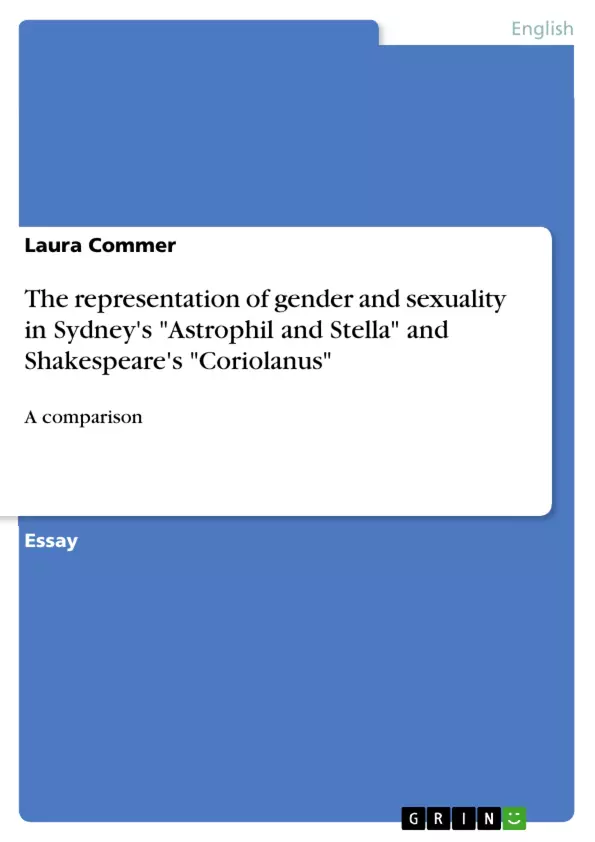Modern literary analysis often deals with different social problems of the time. When looking through texts of other periods it is searched for evidence how people at that time dealt with those problems. In the last 20 years the depiction of sexuality and the term of “gender” – what is masculinity/femininity? – became an important factor in analysing. Thus, in every period there was a depiction on how male and female have to behave and how affection and sexuality is shown.
Comparing two literary pieces of art from one period, one can clearly see the discrepancy even presented by two different
authors.While Shakespeare’s depiction of gender and sexuality has a more masculine tone in his tragedy "Coriolanus", the sonnet sequence "Astrophil and Stella", written by Phillip Sidney gives a more feminine picture of men and women.
Inhaltsverzeichnis (Table of Contents)
- Astrophil and Stella
- Coriolanus
Zielsetzung und Themenschwerpunkte (Objectives and Key Themes)
This text explores the depiction of gender and sexuality in two literary works from the Elizabethan and Jacobean periods: Phillip Sidney's sonnet sequence Astrophil and Stella and William Shakespeare's tragedy Coriolanus. By comparing these two pieces, the text aims to highlight the discrepancies in how masculinity and femininity were presented during this time.
- The construction of masculinity and femininity in Elizabethan and Jacobean England
- The role of sexuality and desire in shaping gender identities
- The impact of social norms and expectations on individual behavior
- The portrayal of power dynamics between men and women in literary works
- The relationship between gender and social status
Zusammenfassung der Kapitel (Chapter Summaries)
Astrophil and Stella
The analysis of Astrophil and Stella focuses on the character of Astrophil, a man deeply in love with Stella, who does not reciprocate his feelings. Astrophil's obsessive love for Stella is depicted as a form of subjugation and emasculation, highlighting the societal expectations of masculinity and the consequences of failing to conform to them. The text examines how Astrophil's desire for Stella is portrayed as both aggressive and misogynistic, ultimately leading to his feminization and social rejection.
Coriolanus
The analysis of Coriolanus explores the play's depiction of masculinity through the character of Coriolanus, a proud and self-sufficient Roman soldier. The text examines how Coriolanus's masculinity is constructed through his role in war and his adherence to Roman ideals. However, Coriolanus's pride and inability to adapt to social expectations lead to his downfall and exile, questioning the limitations of traditional masculinity. The text also contrasts Coriolanus's character with the female figures in the play, particularly his mother Volumnia and his wife Virgilia, highlighting the diverse representations of women in Elizabethan drama.
Schlüsselwörter (Keywords)
The primary keywords and focus topics of this text include: gender, sexuality, masculinity, femininity, Elizabethan literature, Jacobean literature, Astrophil and Stella, Coriolanus, social norms, power dynamics, literary analysis.
- Citation du texte
- Laura Commer (Auteur), 2015, The representation of gender and sexuality in Sydney's "Astrophil and Stella" and Shakespeare's "Coriolanus", Munich, GRIN Verlag, https://www.grin.com/document/338480



